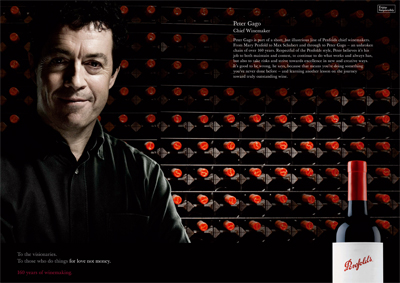Bottom of the barrel
The Fosters Group have served up the dregs for investors with their first profit drop in 16 years, revealing a fall of 88 percent (AUD 117 million) to 30 June 2008, and due mainly to a massive write-down of the value of their wine businesses. Admitting that they paid too much for their wine assets (principally Beringer and Southcorp), Foster’s said that financial returns from wine have not met expectations and that the multi-beverage marketing approach had failed.
However, beer sales lifted by AUD 74 million to AUD 2.5 billion over the year and Foster’s still have seven of Australia’s top ten beers. Nevertheless, some brokers issued a ‘sell’ advice.
At the end of September, Foster’s announced that acting CEO, Ian Johnston, would get the top job after all. Board member Ian Johnston had been made acting CEO after Foster’s CEO Trevor O’Hoy had decided to fall into his sword and resign following the announcement of Foster’s epochal profit drop in June. Mr Johnston, 61, had been on the Foster’s board for less than a year but had previously held executive positions in food and beverage companies, including the position of Managing Director of global confectionery for Cadbury Schweppes.
Perhaps Mr Johnston also had to be made CEO of Foster’s in order to complete the strategic business review started under his predecessor. No new CEO would have liked to release the findings of a review upon which he would have had no influence.
Whatever the eventual outcome of the review, Australia has been rife with rumour that the review will argue in favour of breaking up Foster’s. Foster’s is the number one brewer in Australia’s highly profitable beer market and the world’s number two wine company.
Unfortunately, the global wine business has not lived up to investors’ high hopes. Finding a buyer for Foster’s wine business may prove difficult. Constellation Brands, the world’s number one wine company, is already trying to reduce its presence in Australia (see below).
Perhaps some private equity buyer will take the wine business off Foster’s hands. That could be one explanation why Deutsche Bank has built up a 5.3 percent stake in Foster’s over the past months. Buying Foster’s share on the cheap, Deutsche Bank would benefit from a break-up and subsequent sale. After hitting a four-year low in mid-July, shares in Foster’s have gained more than 30 percent until September, while the S&P/ASX 200 has risen just 3 percent over the same period.
There is another explanation possible, namely that Deutsche Bank is only buying on behalf of an overseas brewing corporation. That possibility has kept the grapevine abuzz for weeks now.
However, market observers have been wondering who that overseas corporation should be. After all, a likely candidate, SABMiller, is already engaged in Australia through its joint venture with Coca-Cola Amatil. Even if SABMiller wanted to make a bid for Foster’s beer business, they would need their partner’s consent, if not to say, financial contribution. But is Foster’s beer business an attractive target? It would be pricey. And what would a buyer get? A domestic business only, as the rights to the Foster’s brands in the world’s most important beer markets have already been sold to others: to Heineken in Europe and to SABMiller in the United States and India.
It is tragic that Foster’s ill-fated expansion into wine, which Foster’s pursued at their investors’ behest, is now threatening the foundations of an otherwise sound business. That’s the trouble with being a listed company. You are not master of your own house.

